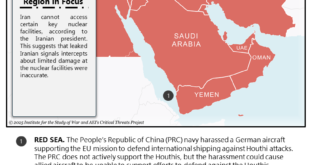Close coordination between Israel and Qatar to facilitate sufficient funding for Hamas to keep Gaza’s economy from collapsing will likely be the key to moving Doha to a normalization deal.
Relationships developed between Israel and Qatar to provide sufficient funding to Hamas and avoid an economic collapse and war in the Gaza Strip could be the engine for normalization between Jerusalem and Doha, The Jerusalem Post has learned.
Pressed that in November, Qatar rejected any imminent normalization with Israel, sources told the Post confidently that this would likely change during the incoming Biden administration’s term.
Further, they said that close coordination between Israel and Qatar to facilitate sufficient funding for Hamas to keep Gaza’s weak economy from collapsing will likely be the key to moving Doha to a normalization deal.
Ironically, even as Hamas is committed to Israel’s destruction and periodically fires rockets at Israeli towns and cities, the strange dynamics with Gaza’s rulers could help bring a legitimacy coup for Israel with the state that runs the influential Al Jazeera network.
Qatar has long been a focal point for many parties in the Middle East and Doha has been in a diplomatic and economic war with Saudi Arabia and other moderate Sunni Gulf countries since June 2017.
In mid-December, Palestinian Authority President Mahmoud Abbas met with Qatari Emir, Sheikh Tamim bin Hamad al-Thani, to try to convince him to host a peace conference in 2021.
The idea would be to move the conversation back from the Trump peace plan to the previous conventional Palestinian-Western plans for peace.
Surrounding all these contacts with Qatar is the fact that the US maintains close relations, including its key military base in the Middle East, in Qatar.
The combination of a US connection along with Qatar’s ability to keep Hamas from starting a broad war, as occurred three times between 2009-2014, was part of what made Israel, through the Mossad, ready to deal with Doha on Gaza issues.
This was in spite of Jerusalem’s unhappiness with many of the more Islamist causes and groups which Qatar supports, including that it has a strong relationship with Iran.
With Israel’s approval, and often with Mossad Director Yossi Cohen’s personal involvement, Qatar has periodically provided millions of dollars in cash to Hamas to keep its economic situation stable so that it will not want war.
When Hamas grew anxious that the payments would end in August, Cohen reportedly even took an especially active role to convince Doha to continue them, despite economic issues in Qatar related to the pandemic.
When attacked by some on the Right that the Mossad and Israel are serving as a middle-man to fund Hamas, Cohen has pushed back hard saying that the funds are humanitarian and that complex decisions are preferable to war.
Sources also indicated that there could be a breakthrough in unfreezing relations between Qatar and the Saudi-led Gulf states coalition as early as next week, while Trump is still in office.
Statements by officials on the possibility of Israeli-Qatari normalization have to date been mixed.
In October, US Treasury Secretary Steven Mnuchin visited Qatar but declined to tell the Israeli media anything definitive about whether Qatar would be the next country to normalize ties with Israel or whether the US will sell it F-35 stealth jets.
Also in October, Intelligence Minister Eli Cohen told Army Radio that to preserve its qualitative military edge, Israel will ask the US not to sell F-35 fighter jets to Qatar.
“For us, our region still hasn’t become Switzerland. Israel is the most threatened country, not only in the Middle East, but in the whole world, and as such, we need to preserve our superiority,” he said.
In mid-December, Rabbi Marc Schneier, an unofficial envoy for normalization with Gulf states, told the Post: “I won’t be content until I see Qataris, Saudis, Omanis and Kuwaitis join as well. Then, you will see a transformation.”
Qatar is preparing for the World Cup, and Schneier thinks it is a natural fit for Israel.
“Qataris are very excited about welcoming Israelis for the World Cup,” he said.
Schneier has worked on addressing the needs of kosher cuisine in Doha.
“In regard to the question about Israeli guests coming to watch the games, the Qataris have already said that they will be allowed to do so,” he said. “But I believe that by November 2022 [the start of the World Cup], we will already see relations between them and Israel.”
He also said that moving forward with Qatar might require progress with the Palestinians, but that this could also be more likely with the incoming Biden administration.
 Eurasia Press & News
Eurasia Press & News


